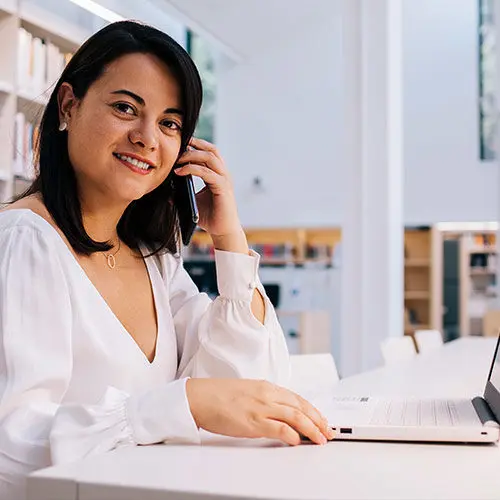I think we would all agree that professional development (PD) is important, but how do we learn about what it means, and how do you go about finding out what you need?
When I think back to when I started work, I realise that I have been very lucky with my own PD journey. I have often been guided and given a clear path as to what I should be doing. As a library assistant way back in the 1980s, I was told to apply and do the City and Guilds Library assistant’s course. At the time, I remember thinking how nice it was to get out of the library to visit other libraries around the country (U.K.) and to get off the enquiry desk a few times a month. I don’t think I made the connection with professional development at the time, but it was. What I did not realise, however, was the important link to learning and developing, when it was something that really interests you. I had done OK at school but could not wait to leave and, if you had asked that 16-year-old me if I would ever do any kind of studying again, the answer most definitely would have been no.
Fast-forward to me going back to work after having my family. It turns out that this was my time to really study properly for the first time, and I have to say that, even as hard as it was, this is where I found my love of learning. After getting my degree in Information and Library Studies, I started my first professional role for Schools’ Library Service, and this is where I really became aware of PD for the first time. I was told that I was expected to attend a conference once a year—which at the time caused no end of problems with a young family and busy husband. But I went and learnt to enjoy them, partly because it got me away from said young family and busy husband for a couple of days, but also I began to find conferences less daunting and began to see some learning opportunities. We were, however, expected to come back and present our learning to our colleagues… not something I was very keen to do. It felt like being asked to read a book for pleasure and then write about it, which took away all the pleasure from reading the book in the first place. I did not really understand the role of reflecting on my learning, and I was more than happy if this part got forgotten; who was I to remind them?

What I did not appreciate at the time was, without the feedback and evaluation, PD had no benefit. Unless I took the time to reflect on whom I had met and what I had learnt, it was soon forgotten.
So apart from a conference once a year, did I do anything for myself at the time? If I am honest then no… why would I? I was doing a good job, I was doing my annual PD, and no-one was questioning my learning and development, so all was good. I would occasionally read something from my professional magazine if it caught my attention, but, apart from that, there was nothing. Who has time for PD outside of work? I certainly did not feel that I was missing out on anything, so why give time to it, and I know that I couldn’t be the only person to feel this way.
What changed?
I began to get interested in the possibility of changing things for the better for those who I was there to support. I began to understand that, if I knew more about school libraries and what they could do for students and teachers, I could be providing a better service and feel more fulfilled in my role. If I understood more, I could talk about it with confidence, and this would make a difference to how I was perceived in schools. I wanted to be more than the “library lady”; I wanted to be accepted as an equal to the teaching staff, but I had to believe that myself, too.
I came across four things that led me forward:
- Chartership (again encouraged by where I worked): This was where I learnt to critically evaluate what I was doing, a skill that has stayed with me.
- Information literacy and inquiry learning through FOSIL (Framework Of Skills for Inquiry Learning), which I profoundly believe are essential tools and skills within education.
- Blogging, which allowed me to use my newly found skill of critical evaluation to its full effect.
- IFLA School Library Guidelines, which I believe is the tool all school librarians need to give them focus and guidance.
Together they fired my interest in learning for my own development and also in sharing my learning with others. Finding something that interests you is certainly the key to all of this. A recent conversation with Darryl Toerien, Head of Inquiry Learning at Blanchelande College, led me to understand something fundamental in how important PD is for you. How can we be inspirational and support our students and teachers if we are not interested and excited about what we are doing ourselves?
Ongoing Professional Development
What I found was it was not a quick process, it is never finished and to be honest, one that I am still learning. My journey with PD is ongoing, as it should be for all of us. I like quick results and unfortunately, you don’t get this from PD. What I did get, however, is the passion of a subject and a love of learning. I am an impatient person, and PD takes time and effort, which is why I find it hard. If no-one is telling me to do it, I can easily fall into the trap of feeling that I know enough, and I know that I am not alone in this. I have to say here that I would have found it beneficial if CILIP had voted in compulsory revalidation for Chartership/Fellowship, as motivating myself to do it is hard…. My fellowship is due for revalidation, and I must get round to it (note to self!).
As I have had to find a way to motivate myself, you may have noticed I do that by putting myself out there. I don’t like to let people down, so my big step forward a few years ago was to provide online PD for school library staff, which gave suggestions for reading once a month. I found articles, blogs, TED Talks, podcasts, or books that I thought would be interesting and relevant, and I then created some questions to get the conversation started.
This meant I had to read what I had suggested, so it was for purely selfish reasons I did this. Thankfully, people do join in, which made it enjoyable to do. Check out #LibraryStaffLoveLearning to see some of the discussions.
How Can You Start This Journey?
This is a very personal journey, so my tips for going forward are very general.
- Understand your own interests relating to your own job and role. Learning more about something builds up your knowledge and expertise.
- Find what excites you. Do this because you want to, not because you feel you should.
- Focus your reading on those areas of interest. You don’t need to read every article in your professional magazine—just the ones that interest you.
- Follow up on suggested links and reading.
- Find some online PD that works for you: webinars, book clubs, forums, social media…
- Ask yourself what you have learnt—good or bad! Being critical is OK
- Write about what you have learnt… If/when you are ready, share your learning through blogging.
If you want to know more about blogging, you might find this blog useful.
What Can You Do Today?
If you are interested in general school library things, then check out my website, as it is a good place to start discussing ideas. Or find out about my training membership and join today.
Check out The FOSIL Group website and join the discussions on the forum. Learning from others on the same journey as you are is an important part of PD.
Download and read the IFLA School Library Guidelines.
Finally…
There is no-one telling you that you must take part in any PD. This really is about your own personal journey and your own need to develop professionally. If you choose not to do anything about it, no-one will know apart from yourself, but just think about how much more exciting your role could be if you found the fire in your belly to increase your knowledge and understanding of something you really love! I really hope you can find what you are looking for, and I look forward to reading all of your blogs.
See also:


